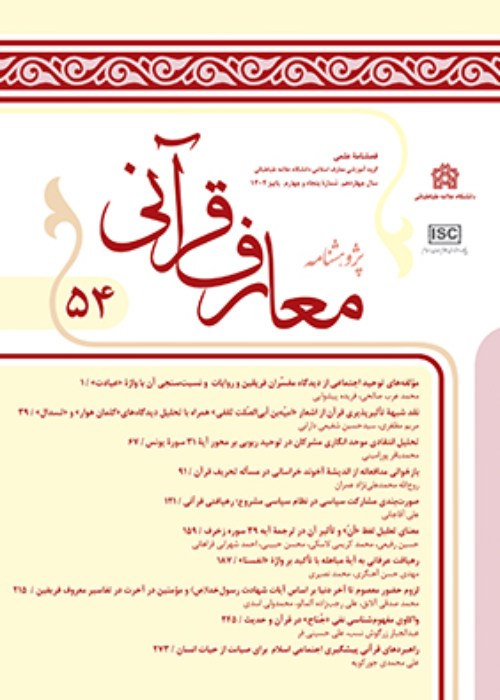The Role of Observation in Understanding the Divine Āya's [Signs]
Author(s):
Abstract:
Āya [sign] as a word refers to an observable object whose being observable is in order to convey to as person a message which is in line with a particular purpose and which draws that person’s attention to a certain direction, albeit within the limits of that person’s level of knowledge and understanding. God Almighty has presented the signs in the outer world [āfāq] and the signs within the human self [anfus] in order that the observer reaches an understanding and that the authenticity of the sign be proved. The human thought is able to transcend limits of time and space and thus revisit and reshape sensory inputs. Considering the ultimate purpose of the act of thinking plays an important role in making that thinking positive or negative, and therefore in human’s attaining to guidance [hidāya] or error [zalāl]. The most efficient kind of thinking is therefore thinking about ultimate purposes. Inputs of all senses can be a starting point for thinking about the ultimate purpose of any given sign. However, observation, as the input of the visual sense, has a particular importance and its different types can be used for observing signs while considering their ultimate purposes. Types of observation of signs include: observing themes and signs of the nature while considering their relationship to the human being, extending observation of natural signs with the aim of acknowledging the purest form of Oneness of God [Tawhīd] as is realized through lā ilāha illa-llāh [There is no God but Allah], observing to make connections with natural phenomena while considering that they have certain levels of understanding and behave in a certain way before God Almighty (and learn from it), observing objects while considering their dependence upon God, observation with the aim of understanding the hikma [wisdom] and ultimate purpose of a given topic, and top-down observation aimed at discovering unknown and necessary relationships between objects.
Keywords:
Language:
Persian
Published:
Journal of Qur'anic Knowledge, Volume:3 Issue: 13, 2013
Page:
31
magiran.com/p1317344
دانلود و مطالعه متن این مقاله با یکی از روشهای زیر امکان پذیر است:
اشتراک شخصی
با عضویت و پرداخت آنلاین حق اشتراک یکساله به مبلغ 1,390,000ريال میتوانید 70 عنوان مطلب دانلود کنید!
اشتراک سازمانی
به کتابخانه دانشگاه یا محل کار خود پیشنهاد کنید تا اشتراک سازمانی این پایگاه را برای دسترسی نامحدود همه کاربران به متن مطالب تهیه نمایند!
توجه!
- حق عضویت دریافتی صرف حمایت از نشریات عضو و نگهداری، تکمیل و توسعه مگیران میشود.
- پرداخت حق اشتراک و دانلود مقالات اجازه بازنشر آن در سایر رسانههای چاپی و دیجیتال را به کاربر نمیدهد.
In order to view content subscription is required
Personal subscription
Subscribe magiran.com for 70 € euros via PayPal and download 70 articles during a year.
Organization subscription
Please contact us to subscribe your university or library for unlimited access!


